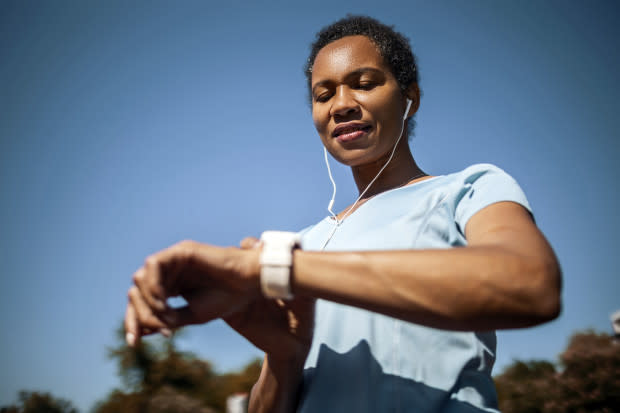These Are the Best Workouts for Every Decade of Your Life

Let’s face it: With age comes a lot of changes mentally and physically. Many people feel like they have endless energy in their 20s. Fast forward a few decades and in your 40s and 50s, the fatigue starts to set in and joint pain begins. And needless to say, staying active becomes more difficult.
But the good news is that you can enjoy and benefit from exercise at any age—it just requires choosing the right workouts for your body and physical fitness level. Here are the best workouts for each decade of your life.
The Best Workouts for Each Decade of Your Life
In your 20s: Upper body exercises and strength training
In your 20s, it’s good to specifically target the shoulders and back with exercises like lat pulldowns, banded pull-apart and skull crushers. These exercises are great at correcting posture like a forward head position (sometimes called “tech neck”).
Working on these exercises early can help eliminate upper back pain and even improve some issues caused by teenage scoliosis or sitting in rigid school desks, Matt Scarfo, a NASM-certified personal trainer and Precision Nutrition Pn1, explains. Since people in their 20s tend to be finishing college, prioritize building good posture early.
For this age group, strength training is essential.
“This is a time when most people are still growing into their bodies, so an emphasis on strength training makes a lot of sense, even for people who aren't dedicated athletes,” says Caroline Grainger, ISSA-certified personal trainer. “This will help to build your body's strength, stability and injury resilience in later years—as long as you keep good exercise habits.”
Related: If You Want To Improve Your Posture, Give These 7 Simple Rear Delt Exercises a Try!
In your 30s: Deadlifts
People start complaining about lower back pain during their 30s, so it’s time to correct it with workouts that specifically target and build those muscles. Deadlifts are one of the best workouts you can do to build your lower back so that you don’t have any problems rounding your spine as you sit and age, Scarfo states.
New moms and dads will also love deadlifts because they can help them get better at picking up their kids. When you brace to pick up a heavy deadlift, you can also trigger your pelvic floor, which is important for new moms recovering from childbirth.
In your 40s: Squats and yoga
We know that people complain about their knees hurting as they age, and that means it's more important than ever to practice squatting properly. Squats, whether they’re weighted or not, can help build the muscles around the knee so they’re strong and stable as you age, Scarfo explains.
Squats and deadlifts are also some of the workouts that build the most muscle in the body, and it’s important to prioritize muscle growth since people start to lose muscle mass after they turn 30.
Related: Here's Exactly How Many Squats You Need to Do Per Week to See Results, According to Trainers
If you build a strong base in your 20s and 30s, this is a period of your life when maintenance through cardio, combined with a strong emphasis on stretching and yoga for flexibility, will serve you well, Grainger states.
In your 50s: Core work
As people age, we know they fall more easily. Nothing builds and improves balance like working on your core muscles. Taking the time to do planks, standing knee-raises, marching, and Russian twists will help ensure that you can stay active later in life with a great foundation that will keep you on your feet and out of the hospital, Scarfo states.
60s and up: Cardiovascular activity
Staying active in any way is essential as you age. But focusing on strength work as you get older can make some people nervous. Scarfo says that cardiovascular exercise in your 60s and beyond can keep your heart healthy and keep you moving regularly.
Whether you like to walk around the neighborhood, bike, swim or run, these heart-healthy activities will keep your energy up and can help prevent weight gain.
Next up: Break a Sweat! 125+ Free Streaming Workouts to Do From Home
Sources
Matt Scarfo, a NASM-certified personal trainer and Precision Nutrition Pn1
Caroline Grainger, ISSA Certified Personal Trainer